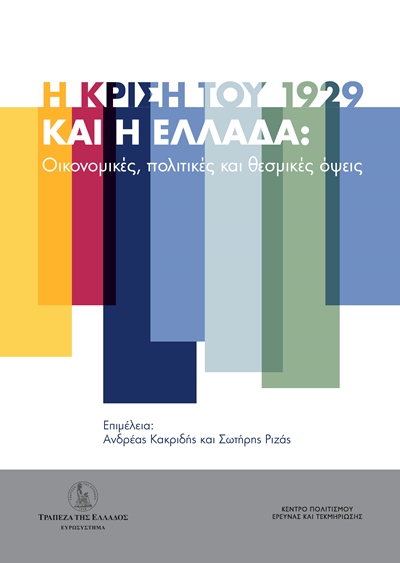
Title: I kríse tu 1929 ké i Elláda: Economikés, politikés ké thesmikés ópsis, [The crisis of 1929 and Greece: Economic, political and institutional aspects]
Editors: Andreas Kakridis and Sotiris Rizas
Publisher: Bank of Greece (Centre for Culture, Research and Documentation)
Year of publication: 2021
Number of pages: 256
Dimensions: 24 x 17.3 cm
Book type: History
ISBN: 978-618-5536-09-1
DOI: doi.org/10.52903/ccrd.h1.2021
Central Distribution
a. National Bank of Greece Cultural Foundation (ΜΙΕΤ) in Athens (13 Amerikis Str., tel.: +30 210 3614143) and Thessaloniki (11 Tsimiski Str., tel.: +30 2310 288036)
b. Ι. Nikolopoulos & Co. SA – Ekdoseis tou Eikostou Protou (9 Ζaloggou Str., Athens, tel.: +30 210 3800520).
About the book
The crisis of 2008 evoked great interest in the previous large-scale crisis of world economy, that of 1929. In relevant research, priority was given to the economic aspects of the latter. However, its other consequences –political, social and diplomatic– gradually entered the focus of interest as well, leading to approaches that are more sophisticated.
Among the major advantages of this volume is that its contributors come from a variety of scientific fields and look at the 1929 crisis not only from different perspectives, but with different methodological tools as well, combining archival research either with more quantitative or more theoretical approaches.
The volume consists of three parts. In the first part, issues of economy and economic policy are addressed; individual chapters therein are written by Socrates Petmezas, Nikos Christodoulakis and one of the two editors of the volume, Andreas Kakridis. The second part is dedicated to the international dimensions of the crisis and includes chapters written by Konstantina Botsiou, Ekaterini Bregianni and Manolis Koumas. In the third part, political and institutional issues of the 1929 crisis are discussed by Spyros Vlachopoulos, Zinovia (Jenny) Lialiouti and the other editor of the volume, Sotiris Rizas.
The thread that binds the papers of this volume together is the common finding that the economic crisis translated into a paradigm shift towards protectionism and economic nationalism, but also caused social and political destabilisation with consequences for the representative institutions. Fortunately, this was not repeated in the 2008 crisis. Democratic institutions endured the pressures generated by the crisis and the system of open economy and free transactions kept afloat. It is not unimaginable that policy makers, i.e. governments and central banks, took into account experiences gained from the middle-war crisis.